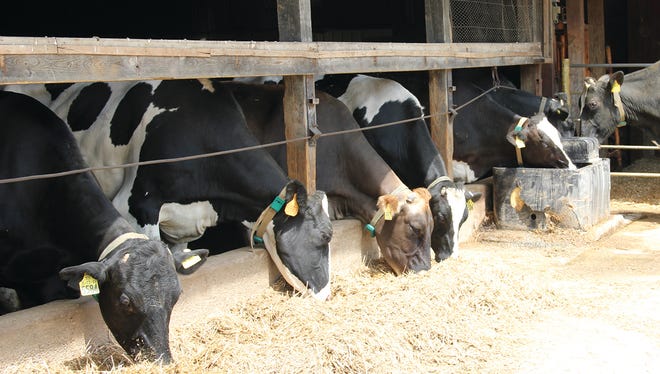DNR investigating manure spill in St. Croix County

TOWN OF EMERALD - The Wisconsin Department of Natural Resources is investigating a large manure spill from the Emerald Sky Dairy in St. Croix County.
DNR officials confirmed that the spill on the town of Emerald farm occurred in late 2016 but was not reported until March 29, 2017. According to DNR staff, the majority of the release is contained in a wetland area, downslope from the farm’s waste storage facility. The wetland drains through a ditch and enters a storm water pond about 1,200 feet away.
"The storm water pond is impacted by liquid and solid manure, and the outlet has been closed to prevent additional impacts to a wetland area downstream from the storm water pond," DNR officials said in a statement. "Department staff are continuing to investigate the situation while working with the dairy and contractors to continue the cleanup of the spill and develop a long term restoration plan."
Citizen watchdog group Emerald Clean Water for All contacted The Wisconsin State Farmer to report that an "anonymous tip" about the December spill at the CAFO brought the incident to the attention of St. Croix County officials.
The group says that County staff investigated and found tens of thousands of gallons of both liquid and solid manure in the storm water pond and adjacent wetland at Emerald Sky Dairy after a check valve allegedly burst causing the spill.
Kim Dupre, a neighbor of Emerald Sky Dairy and member of Emerald Clean Water For All says being a Concentrated Animal Feeding Operation (CAFO), Emerald Sky Dairy is required to report manure spills to state officials. Dupre said the spill was finally reported months later at the insistence of county officials.
“This is a prime example of the State's flawed 'self-reporting' regulation of industrial farms,” Dupre said. “Since no one was notified of this massive spill, neighbors could not take precautions for their drinking water in this aftermath nor could government entities respond in a timely (manner)."
Emerald Sky is a CAFO with a WPDES permit. In April 2016, Emerald Sky submitted a preliminary application requesting the DNR modify its WPDES permit to accommodate an expansion from 2,460 animal units to 8,804 animal units. The DNR is currently waiting for the operation to submit final application materials before it begins processing the modification request and making any decisions regarding the expansion.
Via state regulations, CAFOs like Emerald Sky are required to obtain WPDES permits, which are water quality protection permits designed to ensure proper storage and handling of manure from larger-scale livestock operations.
Dupre says 90 families live within two miles of Emerald Sky Dairy.
"Area residents are encouraging their neighbors to get their wells tested since this spill occurred nearly 4 months ago and ground water may have been affected," she said. "Depending on their location and weather conditions, these types of spills may result in residential well contamination and local stream fish kills."
The 1700 cow dairy is located in the watershed of the Willow, Kinnickinnic and St. Croix rivers.
Dupre said the St. Croix County's Board of Supervisors convened a Ground and Surface Water Quality study committee in January 2017, prompted by the application of Emerald Sky Dairy for a conditional use permit to expand the number of cows from 1,700 to over 6,000.
“I would wonder if the management of this dairy cannot follow regulations or protect our drinking water with the 1,700 cows they have now....how could they manage a herd of over 6,000?" she said. "I would hope this incident will be thoroughly reviewed by the Ground and Surface Water Quality study group and St. Croix County's Board of Supervisors.”
A full report by the DNR is being assembled and will be available for public review once complete. This incident will then be forwarded for evaluation to DNR enforcement staff.